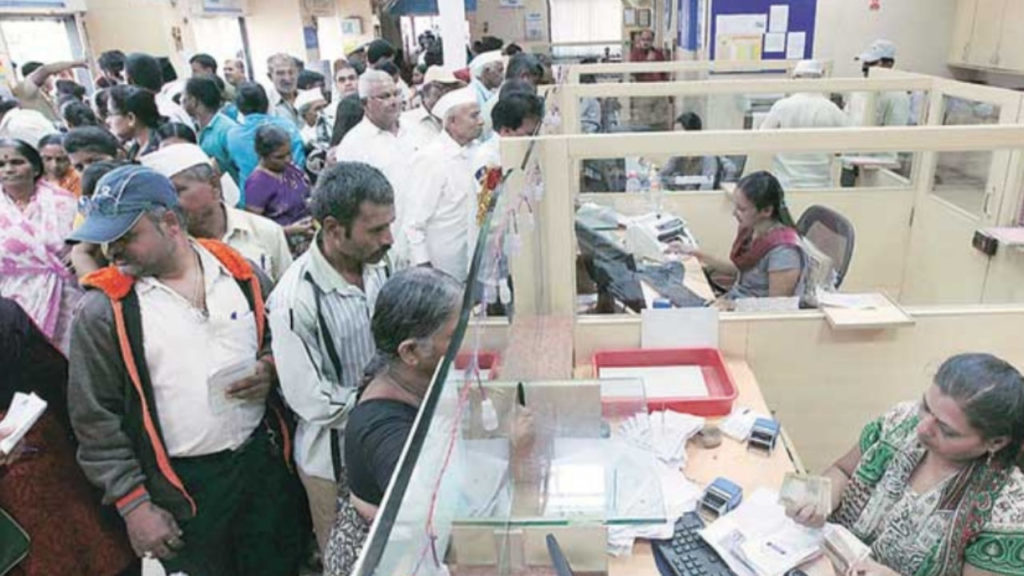15% Salary Hike For 8.5 Lakh Bank Employees Approved; Both Private, Public Banks Covered

The representative body of management banks in India, Indian Bank Association (IBA) and United Forum of Bank Unions (UFBU) have reached an agreement to hike the salary by 15% for the 5 year period between 2017 and 2022.
Read on to find out more about the wage hike…
Banks Will Have An Additional Yearly Burden of Rs 7900 Crore With 15% Pay Hike!
The development comes after nearly 3 years of intense negotiations at a marathon meeting which was conducted at the State Bank of India (SBI) headquarters in Mumbai between the IBA and UFBU. The meeting was held between IBA representatives led by Raj Kiran Rai and bank employee union representatives led by UFBU Convenor, C H Venkatachalam on Wednesday
This move will result in an additional of Rs 7,900 crore yearly burden for the banks.
Venkatachalam said that the hike in wages will impact as many as 8.5 lakh bank employees across around 37 banks including public, private and foreign banks, in India. This development will be effective from November 2017.
IBA in a statement said that basic pay has been merged with dearness allowance (DA).
According to the agreement between the trade union and bank management, there will also be an increase in the banks’ contribution to the NPS (New Pension Scheme) fund to 14 %- pay and dearness allowance- from the prospective date of signing the settlement subject to the approval of the government. The present contribution stands at 10% .
IBA Chief Executive Officer Sunil Mehta said in a tweet, “Today IBA & UFBU have signed an MoU for 15% increase in pay slip component of Bank Employees, in Principle agreement to remove cap & offer 30% of Basic Pay as family Pension.”
The implementation of wage hike and allowances’ details are expected to be finalised in the next few days.
The Performance Linked Incentive (PLI) To Be Introduced! What Is It?
As per the agreement, Performance Linked Incentive (PLI) will also be introduced for Public Sector Bank (PSB) staff . This will be based on operating or net profit of the concerned individual banks.
The amount of PLI will be nil if the operating profit of a lender is less than 5%. If the operating profit is between 5-10%, employees would be entitled to get an additional 5 days salary. If the operating profit exceeds 15% on an annual basis, an additional 15 days salary will be given. This will be applicable only if the bank concerned has a net profit.
PLI will be applicable for PSBs from the current fiscal year, while it will be optional for private and foreign banks. The PLI would be payable to all employees annually over and above the normal salary payable.
The Age Old Issue: The Wage Disparity Between Public and Private Sector Employees!
The IBA and UFBU negotiate wages for bank employees in member banks once in every 5 years. The two bodies reached a consensus after a long delay which was originally due in November 2017.
The last hike awarded by IBA was in the 2012 round. For the 2017-22 round, employees had originally demanded a 20% hike while the IBA had initially offered 12.25% . All India Bank Employees Association General Secretary C H Venkatachalam said, as many as 35 rounds of negotiation meetings took place before reaching the common ground and the outcome is satisfying.
The disputes on the wage issue between the trade unions and IBA go way back. For several years, unions have complained about Public Sector Undertaking (PSU) bankers being underpaid by the government and that they can’t even be compared with the private sector lenders.
In fact, evidence states the same. According to the annual report released by HDFC Bank, its Managing Director (MD) Aditya Puri took home a total remuneration of Rs 18.9 crore in the FY 2019-20 whereas Rajnish Kumar, the chairman of India’s largest bank, SBI earned Rs 31.2 lakh in 2019-20.
This long-standing wage disparity problem has created a lot of debates among top central bank employees.
However, the government apart from a few tweaks here and there hasn’t done anything solid to revise the pay structure of PSU employees.
In August 2016, former RBI governor, Raghuram Rajan kicked off a debate on the subject when he said salaries of top-level employees of PSBs, including the RBI, are way short of global standards. Rajan had said, “One of the problems, of course, is that public sectors overpay at the bottom but underpay at the top. I also feel underpaid.”

Comments are closed, but trackbacks and pingbacks are open.